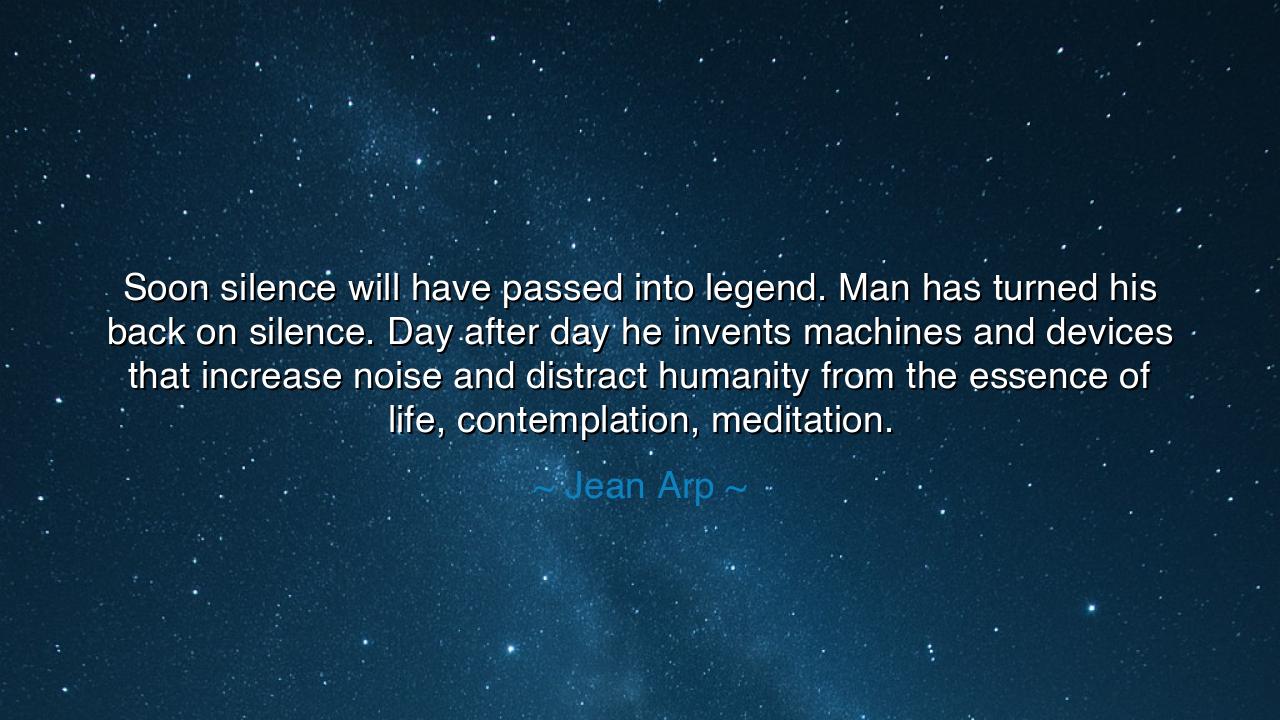
Soon silence will have passed into legend. Man has turned his
Soon silence will have passed into legend. Man has turned his back on silence. Day after day he invents machines and devices that increase noise and distract humanity from the essence of life, contemplation, meditation.






Hear the lament of Jean Arp, poet and artist of the Dadaists, who warned: “Soon silence will have passed into legend. Man has turned his back on silence. Day after day he invents machines and devices that increase noise and distract humanity from the essence of life, contemplation, meditation.” His words, spoken in the twentieth century, are both prophecy and rebuke, a reminder that as our tools grow louder, the quiet voice of the soul grows fainter.
For what is silence, if not the womb of wisdom? In silence the prophet hears truth, the philosopher contemplates eternity, the artist finds vision, and the common soul discovers peace. It is no accident that saints retreated into deserts and monks dwelled in cloisters; in silence, they touched the eternal. Yet Arp saw humanity fleeing from this gift, rushing instead toward noise, toward endless stimulation, filling the stillness with the clamor of invention.
History proves his vision true. In the age of the Industrial Revolution, the roar of factories drowned the songs of the fields. Where once men walked by rivers and forests, they now lived by smokestacks and rails, lulled not by birdsong but by the rattle of iron. Later came the radio, the television, and now the endless buzz of the smartphone—each new device promising connection and distraction, each pulling man further from the sacred practice of simply being still.
Consider the story of Henry David Thoreau, who in the 19th century withdrew to Walden Pond. Surrounded by stillness, he wrote that “the mass of men lead lives of quiet desperation.” Yet even in his day, the beginnings of industrial noise were spreading, and he warned against losing the essence of life in busyness. Arp’s lament echoes Thoreau’s, but sharper: in Arp’s eyes, silence itself is at risk of extinction, a treasure reduced to legend.
The danger of this loss is not small. Without contemplation, man becomes shallow, tossed about by the latest sound and spectacle. Without meditation, he forgets himself, forgetting that beneath the clamor of machines there beats the eternal rhythm of the heart and the cosmos. Noise without silence is like speech without breath: it collapses upon itself, leaving only confusion and exhaustion.
Yet, O seeker, do not despair. Arp’s words are not only mourning—they are also a call. If the world grows noisy, you must become a guardian of silence. Seek it in the morning before the world stirs, in the evening when shadows fall, in walks through nature, in the turning away from devices that clamor for your attention. In silence, you return to yourself; in silence, you rediscover the essence of life.
Practical steps follow: turn off the machines for an hour each day. Sit in stillness and breathe. Read slowly, not quickly; listen to the wind, the rain, the sound of your own heartbeat. Create space for silence in your home, and let it be honored as sacred. For in silence, contemplation flowers, and in contemplation, wisdom is born.
Thus, remember Jean Arp’s prophecy: “Soon silence will have passed into legend.” Do not let this come to pass. Guard silence as you would guard a flame in the wind. For though machines multiply, though noise rises, the soul still longs for stillness—and in answering that longing, you keep alive the deepest truth of what it means to be human.






AAdministratorAdministrator
Welcome, honored guests. Please leave a comment, we will respond soon